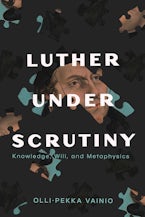The reformer Martin Luther is one of the most influential and controversial theologians in the history of the church. While his ideas are rooted in the currents of medieval theology, he frequently seems to offer radical solutions to classical theological problems. Luther’s place in the history of the church is convoluted, yet the themes and issues addressed in his writings remain relevant for the church today, as evidenced by his continued influence on Protestant dialogue. This enduring relevance encourages and even demands fresh, critical interpretation of Luther with the benefit of modern perspectives.
Rather than offering an apology for Luther, Luther under Scrutiny advances such a fresh interpretation, a critical account of many of Luther’s central ideas that set the Reformation into motion. These include, among other things, his views on the possibility of knowledge and the fallenness of reason, his contentious account of bound choice, and his appropriation of the patristic doctrine of theosis. Olli-Pekka Vainio, a member of the Finnish School of Luther research, asks whether Luther’s radical views end up undermining his entire theological vision.
In order to save theology, Luther seems to be on the path of destroying the very foundations of theology as a public endeavor. Nonetheless, a charitable engagement with his ideas, many of which were ingenious and are still valuable, should not reject Luther altogether. Walking the line between wholesale rejection and blind acceptance, Luther under Scrutiny invites the reader to learn from both the reformer’s achievements and mistakes by engaging his thinking through critical lenses.

